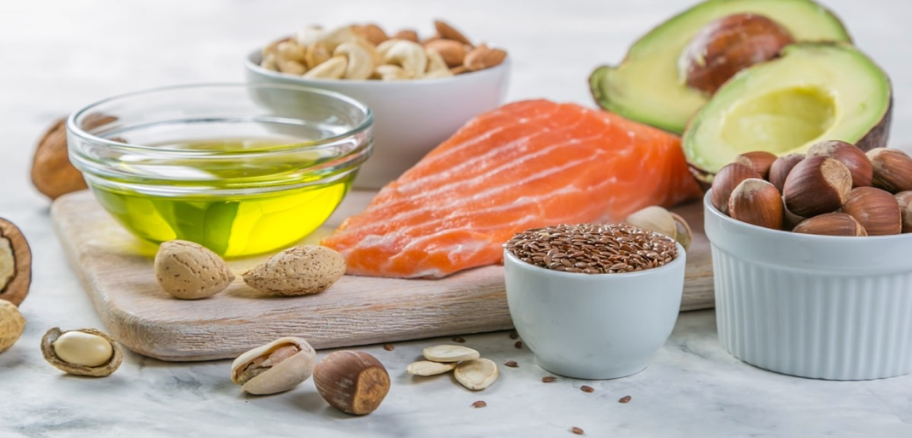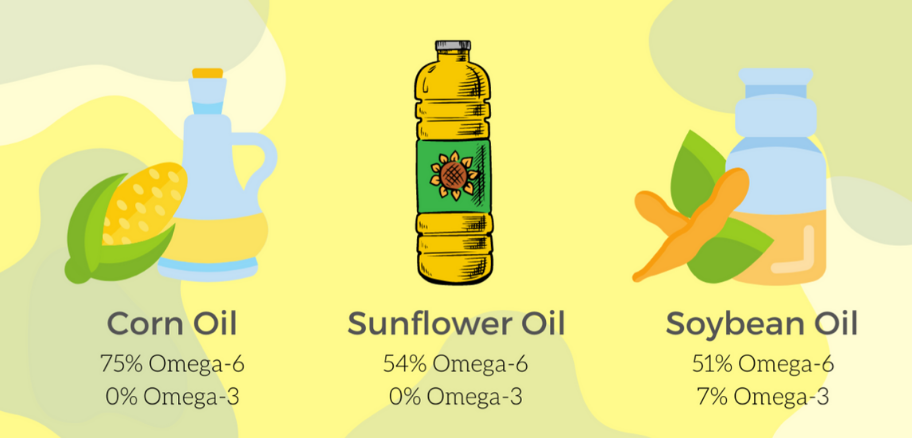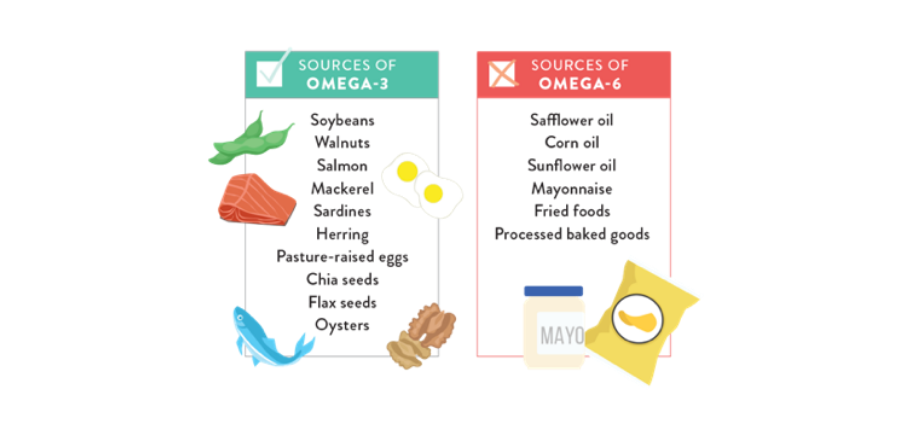You Are What You Eat & You Will Want to Eat More of this Fat!
category: Health Optimization

Historically, our ancestors were hunter/gatherer’s consuming a diet in an environment where most fat was consumed through seafood and wild animals containing Omega-3 fatty acids, a type of polyunsaturated fat. Not a diet of french fries or donuts! Refined oils (corn, canola, soybean) that are heavy in Omega-6, another type of fatty acid, have replaced most of those natural sources. While Omega-6 is essential for health, we don’t need that much of it and it is actually vital to have a proper ratio of Omega-6 to Omega-3. Reevaluating the food we eat to cut out processed oils and incorporating more Omega-3 will not only benefit our health, but is essential to preventing disease.
The problem
Over the last century, our country has rapidly increased its production in refined oils resulting in about 80% of our fat source intake and accounting for 10-20% of our total calories. Refined, a.k.a. seed/vegetable oils, are a by-product of agricultural waste that found their way into our food supply for profit by way of demand for a safer alternative to lard and butter that were produced in unsanitary meat environments. They are a much cheaper alternative to traditional fats and were coined as “healthy choices” in the 60’s and 70’s because they were derived from a vegetable – no wonder it took off! Fast forward to today and they are still found in our processed food products and have replaced the majority of our fat source intake of Omega-3 with Omega-6. When this ratio is off, it can disrupt our overall health. In other words, Omega-6 fats undo any benefit eating Omega-3’s would normally give you.

Prevention of Chronic Disease
It’s no secret that the standard American diet is primarily inflammatory based. Our bodies are constantly fighting to respond to the foods we eat through various symptoms, conditions and diseases. As discussed, vegetable oils make up for a large portion of the average American’s daily caloric intake. These oils create and exacerbate inflammation, which contributes to nearly every disease that makes us fat (not the good kind of fat, think Diabetes). Over time, chronic inflammation can damage your blood vessels leading to a number of diseases including erectile dysfunction, dementia, heart disease and strokes. One study on Omega-3 fats looked at 19 different studies from 16 different countries and found that those with the highest levels of Omega-3 fats in their blood had lower risks of heart attacks. More Omega-3 could potentially benefit your overall cardiovascular health and reduce inflammatory markers in the body.
Mental Health
Believe it or not, your brain is mostly made up of fat! About 60% of your brain is docosahexaenoic acid (DHA), a form of Omega-3. Our brain cells rely on DHA to communicate with one another for proper brain function like memory, cognition and mood. Lower levels found in blood in older adults have been associated with a smaller brain size, which is an early sign of brain aging. Research shows Omega-3 deficiencies increase mental health and neurological disease like depression, anxiety, Alzheimer’s and bipolar disorder!
Healthy Sperm
Male fertility has decreased over the past 50 years resulting in a 40% decrease in sperm density. One reason for this decline can be directly traced back to the effects of a poor diet. We now know that Omega-6 consumption has increased dramatically in present day and that the ratio to Omega-3 has raised with it. When pertaining to fertility, this ratio is crucial as it has been implicated with impaired semen quality in men. Clinical research trials show the following positive correlation:
- Fertile men had higher blood and sperm levels of Omega-3’s compared with infertile men and the Omega-6/Omega-3 ratio was significantly higher
- Higher intake of Omega-3 was positively correlated with sperm morphology (size, shape, appearance) and overall improvement in quality of semen (total sperm count and density)
- Omega-3 has positive effects on reducing oxidative stress, an issue associated with male infertility, by acting as an anti-oxidant
Omega-3 is an excellent nutritional supplement that has beneficial effects on spermatogenesis in human studies that may improve semen quality.
How to fix the imbalance
There are limited sources for Omega-3 available in the standard American diet and over 90% of us are deficient or falling well below the recommended amount. Food sources containing some Omega-3 include certain seeds/nuts, fatty fish and grass-fed animal products, while Omega-6 is prevalent in a huge portion of foods readily available to us for consumption. Food labels can be misleading. An important rule of thumb is to always check the ingredient list for refined oils such as canola, vegetable, soybean, safflower and corn oils.

As an alternative to food sources, a high quality, Omega-3 (aka fish oil) supplementation is an excellent solution! It’s important to be aware that NOT all fish oil supplements are created equal. Finding a sustainably sourced fish oil that doesn’t contain environmental pollutants, heavy metals, mercury, etc. is equally as important as making the decision to supplement.
Looking for a quality grade product? *Click here* to purchase your Omega-3 supplement:
- Readily absorbable! Ideal for individuals concerned about digestive health
- NO additional ingredients required for enhanced benefits
- 3X smaller dose with the same delivery of ingredients when compared to over-the-counter supplements
- 100% fish oil, no dilution
- IFOS (International Fish Oils Standards), a third-party certification that has most strict testing on their oils and the only test that does radiation exposure in their oils
References
Hyman, Mark. “The Missing Fat You Need to Survive and Thrive.” Dr. Mark Hyman 1 Jul. 2016 link here
Benedict, Fran. “How to Incorporate More Omega-3s Into Your Daily Diet.” Chopra, 21 Aug. 2019, link here